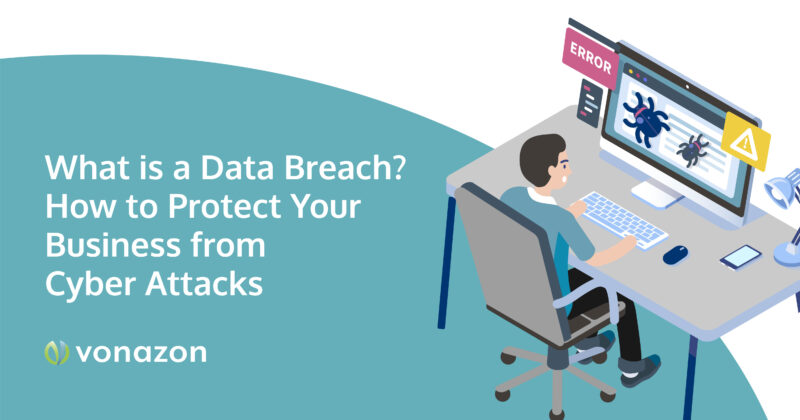What is a Data Breach? How to Protect Your Business from Cyber Attacks
Data breaches do happen from time to time. However, they do not have to be detrimental to your daily company operations – if you have the proper knowledge. Business owners must understand what a data breach is and how to protect their company’s assets from cyber-attacks. Let’s take a closer look a what a data breach is, common causes of breaches, and steps to take for increased cyber attack protection.
What Is a Data Breach?
A data breach is defined as the unauthorized access, use, disclosure, or acquisition of confidential data. This can include personal information such as social security numbers or credit card numbers, as well as corporate trade secrets and intellectual property. According to IBM, the average cost of a data breach is now $143 per record. A business with as little as 500 records could be subject to over $70,000 worth of information lost.
Common Causes of Data Breaches
There are several common causes of data breaches, such as:
- Hacking or malware attacks
Hackers can use a variety of methods to break into computer systems and steal data. Some common hacking techniques include:
- Brute force attacks: Attempting every possible password until one works
- Spear phishing: Sending targeted emails with malicious attachments or links in order to gain access to sensitive information
- Social engineering: Tricking employees into revealing confidential information by posing as a legitimate authority figure
- SQL injection: Injecting malicious code into web pages to gain access to database information
- Theft or loss of laptops, smartphones, or other devices
Employees often lose misplace their work devices. Reports suggest shows that 68% of healthcare data breaches are caused by lost or stolen electronics. When this occurs, hackers can access confidential if they’re not properly secured. Company laptops and phones without encryption are much more susceptible to attacks.
- Third-party vendors
Businesses often share confidential data with third-party vendors such as accounting firms, marketing companies, and IT consultants. If these vendors don’t have necessary cybersecurity protocols in place they can be a major target for unauthorized users.
- Human error
In many cases, data breaches are caused by human error. For example, an employee may accidentally send a confidential email to the wrong person or type in the wrong web address when logging into a secure system.
Businesses can protect themselves from data breaches by implementing strong security measures such as firewalls, antivirus software, and password protection schemes. They should also train employees on how to identify phishing scams and other types of malicious attacks.
How Does a Data Breach Affect Your Business?
If your business experiences a data breach, you may be required to notify customers, employees, and credit reporting agencies. You may also be liable for damages resulting from the breach.
- Customers and employees: If your business experiences a data breach that compromises personal information, you are required to notify affected parties by law. These individuals may be subject to identity theft or fraud as a result of the breach.
- Credit Reporting Agencies: By law, reporting breaches to these entities is required if the attack compromises credit card numbers or social security numbers.
- Liability: Businesses that experience data breaches can be held liable for financial damages caused by the breach.
Cyber Attack Protection from Data Breaches
There are several things businesses can do to protect themselves from data breaches, including:
- Implementing strong security measures such as firewalls, antivirus software, and password protection schemes can help protect your business from data breaches.
- Use a secure file sharing service if you need to share sensitive data with third-party vendors. Make sure the uploaded file is password-protected.
- Limit access to sensitive data. Sensitive data should be limited to only those who need it. This can help reduce the risk of a data breach.
- Train employees on how to identify phishing scams. Employees should be trained on how to identify phishing scams and other types of malicious attacks.
- Staying informed about the latest security threats will keep you on your toes in case you are at risk of an attack.
- Train employees on how to identify phishing scams will enable your team with the knowledge to avoid threats and report them to the appropriate parties.
- Store sensitive data in encrypted files to make it much harder for hackers to access and compromise.
- Use strong passwords that are difficult for unauthorized users to guess.
Businesses that follow these tips can help protect themselves from data breaches and the costly damages they can cause.
Conclusion
Data breaches can have a devastating impact on your business. It is important to take steps to guard yourself from harm to your both your balance sheet and public reputation. Online attacks can happen anytime and are often not discovered until many months after. In order to defend your business, you must understand what a data breach is and the steps you can take to prevent it. It’s ultimately up to you to mitigate the harmful effects that come from these threats.
However, our team at Vonazon is always here to help you navigate the ever-changing cyber attack protection industry. Contact us for a consultation and for more information about our services.
Account Executive
Vonazon Inc.

Vonazon can guide you through the process of creating fun and effective short form videos that are unique to your brand. We can also help you create campaigns around your videos that deliver results, grow your brand’s social media presence, and produce more leads.
Contact us today to begin your short form video journey.








